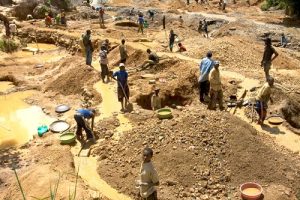The implementation of Africa’s Continental Free Trade Area (AfCFTA) can speed up not only economic and trade development of the continent but also ensuring green growth.
African Development Bank (ADB) also asserts that Building on the broad concept of sustainable development, the green growth model provides a pathway that seeks to achieve growth targets and development objectives in a more efficient, sustainable and resilient manner.
In Africa, the priority is to enhance livelihood security and increase economic prosperity. Although there is no single approach to green growth that is universally applicable to all African countries, promoting green growth on the continent means addressing existing and emerging development challenges without locking into pathways that deplete Africa’s natural capital and leave economies and livelihoods more vulnerable to climate change and other environmental, social and economic risks.
Africa needs to ensure green growth as it cannot afford to lose it shard won growth that comes in a slow pace to impacts of climate change. Africa is already suffering the impacts of climate change. This mainly not because of its own emission, but also of the developed world.
Through the various global forums, the continent is striving to maintain support and compensation for the damage it has sustained as well as for adapting to the impacts of climate change in the future.
Like all the other countries of the world African states have also submitted their respective documents entitled Nationally Determined Contributions (NDC)s that are the statements of the countries commitment towards addressing global warming.
While being good steps in garnering the desired resources for the continents climate change prevention activities, the NDCs or other similar efforts are believed to be more fruitful when the countries integrate their NDCs and/or their climate change policies.
This was indicated by a recent study about the impact of greening the implementation of AfCFTA.
Speaking on behalf of UNECA Executive Director, Claver Gatete, Melaku Desta, Coordinator of the ECA’s Africa Trade Policy Centre (ATPC) told participants of a side event at a COP 28 side “Africa’s Trade and Green Transition: A Continentally Coordinated Approach.” about the need to undertake the implementation of AfCFTA in a way that ensures the environmental safety of the continent.
“As we strive to harness the potential of the AfCFTA, it is essential that we do so in a manner that safeguards our natural ecosystem, promotes renewable energy and mitigates the impact of climate change”
ECA and Centre d’Etudes Prospectives et d’Informations Internationales (CEPII) conducted a study – Greening the African Continental Free Trade Area Agreement’s Implementation -with a view to shedding light on important findings regarding the implementation of the AfCFTA Agreement and parallel adoption of climate policies. It examines how the implementation of AfCFTA agreement can be aligned with green principles, renewable practices and low carbon strategies, according to a Press Release from UNECA.
“The study was conducted against the backdrop of a growing need to consider the impact on the environment as the continent moves towards greater economic integration and take proactive measures to mitigate any negative consequences.”
“Africa is being negatively impacted by climate change despite contributing a small amount to greenhouse gas (GHG) emissions. Currently, Africa accounts for approximately 7% of total global GHG emissions from carbon dioxide and other gasses. GHG emissions in Africa are forecasted to grow faster over the next decades than in other parts of the world, although starting from a relatively low level currently,” said Mr. Desta, adding that as per the study, emissions could rise to nearly 12% by 2045 based on current trends. If large emitting countries implement policies to transition to clean energy, Africa’s economic costs to export goods to those countries could increase.
The AfCFTA creates opportunities for the continent to industrialize and transform through increased trade and as stressed at the session, the AfCFTA stands as a beacon of hope for fostering intra- African trade, economic integration and shared prosperity.”
There are concerns, however, that it could add pressure to climate change through increased manufacturing and transportation use, among others. Analysis shows intra-African trade could be 35% higher in 2045 with AfCFTA agreement in place, as compared to without AfCFTA. About two-thirds of the absolute intra-African trade gains would benefit industrial sectors supporting economic transformation.Supporting this increased trade will require major investments in transportation infrastructure to meet the AfCFTA needs which would be well over 2 million trucks, 100,000 rail cars, 150 vessels and 250 aircraft.
Presenting the key findings, Simon Mevel, Economic Affairs Office at the ECA said they analyzed the impact of implementing the African Continental Free Trade Area (AfCFTA) Agreement on Africa’s GHG emissions. They also assessed implications of pursuing climate policies like Nationally Determined Contributions (NDCs) and carbon pricing in parallel with AfCFTA Agreement’s implementation.
Mr. Rashid Kaukab, Senior Specialist, Trade and Sustainable Development, International Institute for Sustainable Development (IISD) said that the poverty and employment impacts of climate policies shouldn’t be overlooked, while Mr. Babajide Sodipo, Senior Manager, Export Development Advisory, Afreximbank, emphasized the need for innovating financing mechanisms for the success if Africa’s energy transition.
Participants attending the side event acknowledged the conversation is “a timely reminder of the need to find a balance between trade and climate for the benefit of Africa’s future.”
BY ZEKARIAS WOLDEMARIAM
THE ETHIOPIAN HERALD TUESDAY 12 DECEMBER 2023





